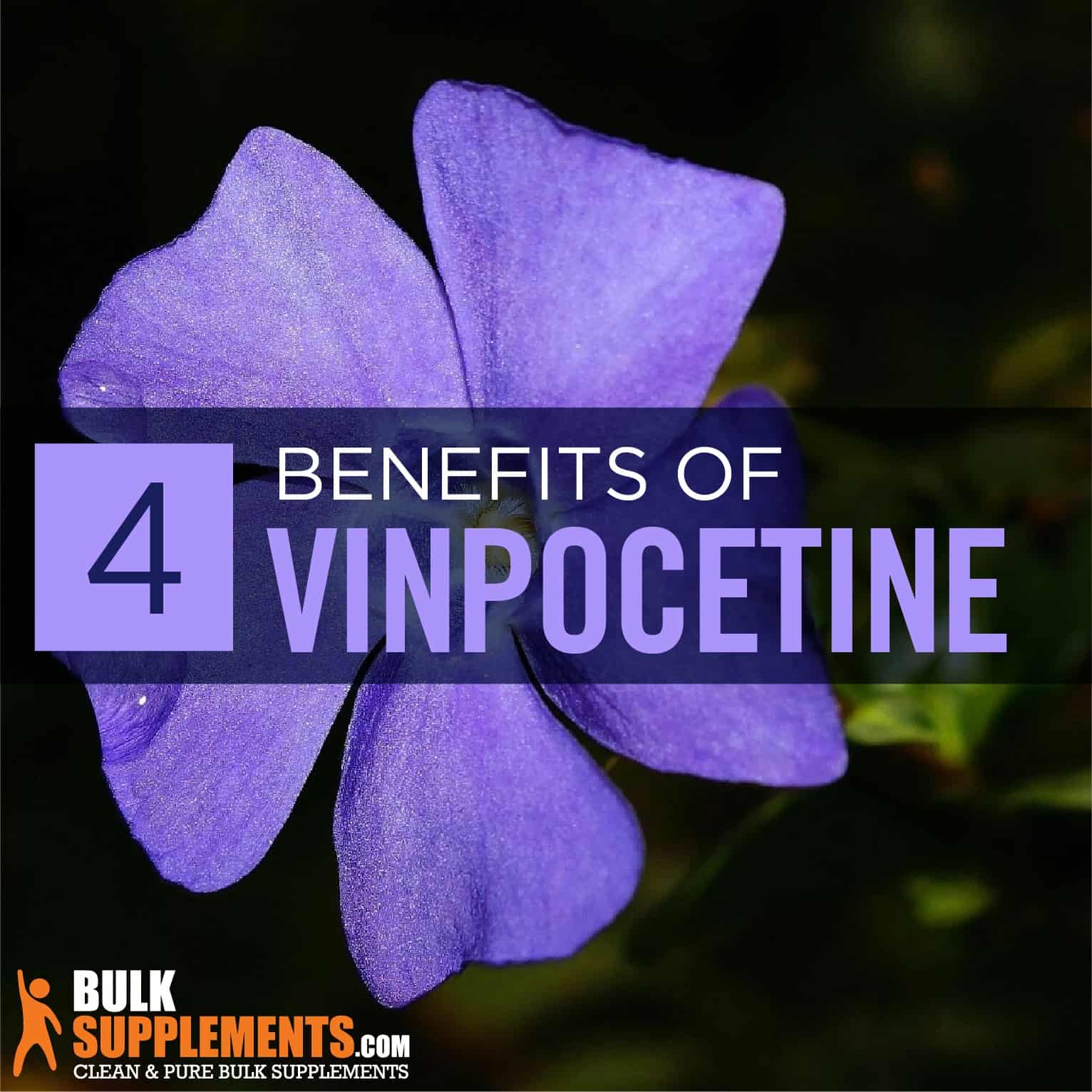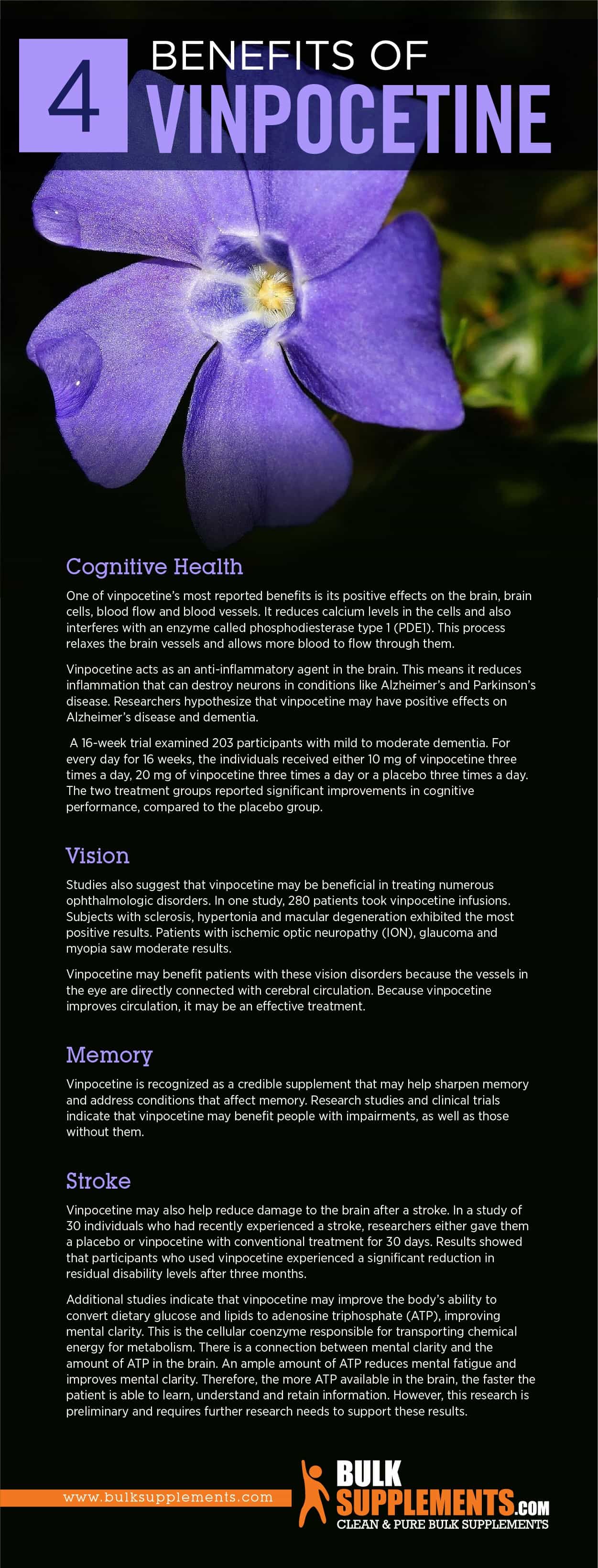Vinpocetine: Benefits, Side Effects & Dosage
by James Denlinger Digital Marketing Strategist
What is Vinpocetine?
The periwinkle flower is more than just a pretty aesthetic. In the leaves of the lesser periwinkle plant is a substance called vincamine and vinpocetine is a synthetic compound that derives from it. A component of alternative medicine, medical professionals developed vinpocetine in Hungary, more than 20 years ago. But now it exists as a prescription drug—named Cavinton and Intelectol—in Europe and Japan. However, in the United States and Canada, it is not available as a prescription medicine, only as a dietary supplement online and in health food stores.
It is an effective nootropic, which is a drug or supplement that aims to improve cognitive function and memory. Nootropics may also have the potential to treat neurological diseases like Alzheimer’s disease and Parkinson’s disease. Vinpocetine is a lesser-known nootropic, but it may pack a powerful punch with its unique mechanisms and possibly powerful cognitive capabilities. Studies suggest that it can potentially help improve memory, increase blood flow and influence metabolism.
If a patient suffers from a cognitive impairment, or is simply looking to maximize memory and mental clarity, vinpocetine is a natural remedy worth looking into.
Benefits of Vinpocetine
Cognitive Health
One of vinpocetine’s most reported benefits is its positive effects on the brain, brain cells, blood flow and blood vessels. It reduces calcium levels in the cells and also interferes with an enzyme called phosphodiesterase type 1 (PDE1). This process relaxes the brain vessels and allows more blood to flow through them.
Vinpocetine acts as an anti-inflammatory agent in the brain. This means it reduces inflammation that can destroy neurons in conditions like Alzheimer’s and Parkinson’s disease. Researchers hypothesize that vinpocetine may have positive effects on Alzheimer’s disease and dementia.
A 16-week trial examined 203 participants with mild to moderate dementia. For every day for 16 weeks, the individuals received either 10 mg of vinpocetine three times a day, 20 mg of vinpocetine three times a day or a placebo three times a day. The two treatment groups reported significant improvements in cognitive performance, compared to the placebo group.
A separate double-blind study concluded that 5 mg of vinpocetine twice a day effectively improved memory in patients with dementia and epilepsy. However, medical researchers need to conduct more studies to strengthen these results and come to a more definite conclusion.
Vision
Studies also suggest that vinpocetine may be beneficial in treating numerous ophthalmologic disorders. In one study, 280 patients took vinpocetine infusions. Subjects with sclerosis, hypertonia and macular degeneration exhibited the most positive results. Patients with ischemic optic neuropathy (ION), glaucoma and myopia saw moderate results.
Vinpocetine may benefit patients with these vision disorders because the vessels in the eye are directly connected with cerebral circulation. Because vinpocetine improves circulation, it may be an effective treatment.
Memory
Vinpocetine is recognized as a credible supplement that may help sharpen memory and address conditions that affect memory. Research studies and clinical trials indicate that vinpocetine may benefit people with impairments, as well as those without them.
Stroke
Vinpocetine may also help reduce damage to the brain after a stroke. In a study of 30 individuals who had recently experienced a stroke, researchers either gave them a placebo or vinpocetine with conventional treatment for 30 days. Results showed that participants who used vinpocetine experienced a significant reduction in residual disability levels after three months.
Additional studies indicate that vinpocetine may improve the body’s ability to convert dietary glucose and lipids to adenosine triphosphate (ATP), improving mental clarity. This is the cellular coenzyme responsible for transporting chemical energy for metabolism. There is a connection between mental clarity and the amount of ATP in the brain. An ample amount of ATP reduces mental fatigue and improves mental clarity. Therefore, the more ATP available in the brain, the faster the patient is able to learn, understand and retain information. However, this research is preliminary and requires further research needs to support these results.

Side Effects of Vinpocetine
Vinpocetine is possibly safe in appropriate doses. However, there is still a risk for side effects. The most commonly reported side effects are headaches, stomach pain, nausea and difficulty sleeping. It may also cause dizziness, nervousness and flushed skin. Lower or stop the dosage if you experience side effects.
Interactions and Warnings
Patients who use blood thinners or have hemophilia, heart problems or hypertension should avoid vinpocetine. It may slow blood clotting, so patients with bleeding disorders should avoid it. Also, do not take this supplement for at least two weeks before a scheduled surgery to avoid bleeding during and after the procedure. It may also weaken the immune system, so patients with immunosuppressant conditions like cancer or HIV/AIDS should consult a doctor. Additionally, avoid using it during pregnancy or lactation. Although it most likely will not cause any significant side effects, seek medical advice before taking this supplement and pay attention to any possible side effects.
Dosage for Vinpocetine
As a dietary supplement, the recommended dosage for vinpocetine powder is 10 mg three times a day, or following a physician or healthcare provider’s instructions. Do not exceed the recommended dosage. Always consult a doctor or healthcare provider before adding vinpocetine or any other supplement to your diet.
The Bottom Line
Vinpocetine is a partially synthesized supplement derived from the periwinkle plant for its cognitive health benefits. It is sold as a prescription drug in Europe and Japan. But in the United States and Canada, it is sold as a dietary supplement.
Research indicates that vinpocetine may enhance cognitive health and memory function by stimulating blood flow to the brain. However, it does so without affecting blood pressure or circulation in the rest of the body. It acts as an anti-inflammatory agent in the brain, which may benefit diseases such as Alzheimer’s and Parkinson’s disease. Researchers have also tested it as a potential method to prevent or reduce brain damage following a stroke. It may also act as an effective neuroprotective agent.
The supplement is most likely safe and physicians have only reported mild side effects. However, it may have adverse side effects in patients with certain health conditions and it may interact with certain medications. As with all supplements, it is best to confirm with a physician before adding vinpocetine to a daily supplement routine.
Sponsor Ads
Created on Mar 4th 2020 17:30. Viewed 265 times.



